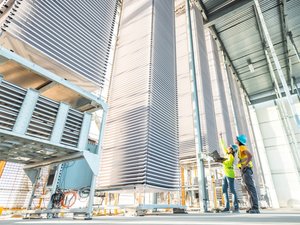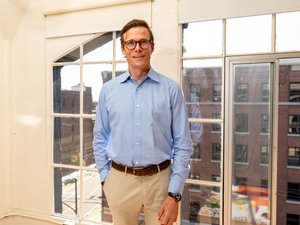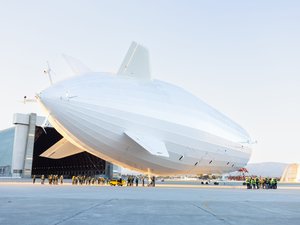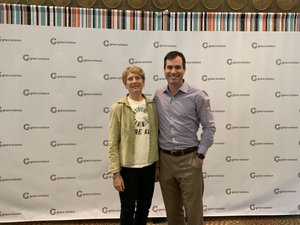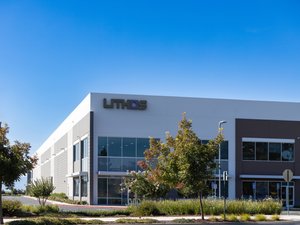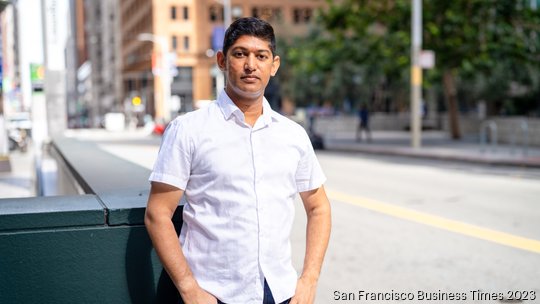
How do you make an aerospace Ph.D. sound simple? Karthik Balakrishnan pulls it off. Testing Einstein’s theory of general relativity in space, using satellites? All in a day’s work as a Stanford student working with NASA. Now, with Actual, the sustainability-focused software company he co-founded in 2018, he’s trying to do something arguably more complicated than rocket science: Combatting the climate crisis. Actual helps companies visualize supply chains, simulate variables and make data-informed decisions to boost efficiency, decarbonization and climate mitigation efforts. It does this via a visual interface that fans of the SimCity video game might find familiar. The result has racked up awards and closed a $5 million seed round in 2022.
Balakrishnan’s first startup, Coin Inc., was a 2013 Y Combinator company whose assets were later acquired by Fitbit. In addition to his work at Actual, he is also a venture partner at Pioneer Fund and an angel investor and startup advisor.
What’s the Actual elevator pitch? We’re a software company and we’re focused really on helping decision-makers at large companies figure out what their strategy for sustainable investment is going to look like.
How might a company use the software?
Let’s say that you’re a trucking company and you’ve got trucks and warehouses. It’s one thing to say we’re going to be net zero by 2050. It’s another thing to figure out that sequence and process of investments to get there. In every industry around the world, whether you’re a utility, whether you’re a food company and you have farms and factories, to become sustainable, it requires investing hundreds of millions or billions of dollars every year for the next couple of decades into your operation, your supply chain, to get there.
Our focus is: Can we provide the software and the tools to actually think about this in a realistic manner?
Actual looks like a computer game, what does that enable?
What we’ve built looks very much like SimCity where you have a map and your assets and your operations and you actually play with the different options in front of you. So instead of going into complex equations or going into Excel, you can actually toggle things around and see what happens if you take away an electric truck and instead use a hydrogen truck? Is that better or worse? What happens if I take these local delivery vehicles and replace them with e-bikes? What are the different options in front of me and how do I get there?
How can you help customers recognize the social impacts of supply chain choices, as well as the climate and economic ones?
One of the really important things about the way we’ve designed our (system) is being able to compute the real-world impacts of decisions, but we’re not narrowly focusing on specific metrics. The idea is that for different projects, the kinds of impacts are going to be environmental impacts, social impacts, health impacts, financial impacts. We allow essentially the user to pick what’s relevant to the decisions they’re making.
You worked on new aircraft management systems at Airbus. Could you envisage flying cars becoming a regular mode of transport?
The technology, from a pure hardware level, works today. Now, battery densities are not as high as they need to be, there’s still FAA and EASA certification. If you’re putting yourself in an aircraft, it’s got to be safe.
In other countries, people are taking rides in these aircraft and delivery drones are being used in a lot of places. So the fundamental building blocks are here today. When it comes to air traffic management, air traffic control systems, all of those things are being proven. The technology is there.
How could that filter into the wider transport system?
My personal view is that it makes a lot of sense for these longer and thinner routes. You might be talking about going from a rural area to an urban area, the kind of journeys where a car might not be great, but where there just isn’t enough density for a transit system.
But if you’re going to get from downtown San Francisco to downtown San Jose, investing in something like Caltrain is probably a much better alternative than tens of thousands of flying taxis going up and down.
What are you doing in the VC space?
Pioneer Fund is a group mainly of Y Combinator alumni. We focus on investing in YC affiliated companies. It’s a very small part of my day-to-day. A big part of that for me is being able to work with other founders. If there are returns, that’s great.
You were in YC’s 2013 batch, what advice would you have for founders coming up now?
I think that this current environment is actually a really good one to build companies because of how cash-constrained customers are.
If someone is willing to spend money on something today, it means it’s really worth solving. And that is the foundation for really enduring business. If in the hardest financial times, people are still willing to pay for it then It’s a must solve problem.
So my advice for founders would be, solve a problem that people are willing to pay for today and recognize that it’s going to be harder to make that sale because there are fewer dollars available.
ABOUT BALAKRISHNAN
- Age: 36
- Born: Oakland, but grew up in Richmond, Calif., and then Maryland.
- Education: Ph.D., Aeronautics and Astronautics with a minor in Physics and an M.S., Aeronautics and Astronautics from Stanford University; B.S., Aerspace Engineering from U.C. San Diego
- Residence: San Francisco
- Perfect weekend: “Go to any farmer's market to load up on stuff for the week. Try to take a long walk, try to get in eight to ten miles of just kind of aimless, meandering, see what we run into.”
- Favorite Bay Area restaurant: Palompie Cafe No. 3 in the Outer Mission; Mumu Hot Pot near San Francisco State University; Sunflower Garden near 9th and Irvine.
- Best burrito in San Francisco: “I don't want to create a never ending war here, but my my wife is partial to plantain burritos at Taqueria Los Mayas on Clemente.”
ABOUT ACTUAL
- Founded: 2018
- Founders: Rajesh Chandran (CEO), Karthik Balakrishnan (President) and Derek Lyons (CTO)
- Employees: 15
- Funding: $5.65 million total funding from backers including Buckley Ventures and Sequoia Scout.
- What it does: SaaS modeling for large scale sustainable infrastructure projects.
- Did you know: Actual was named one of TIME’s 100 Best Inventions of 2022.
